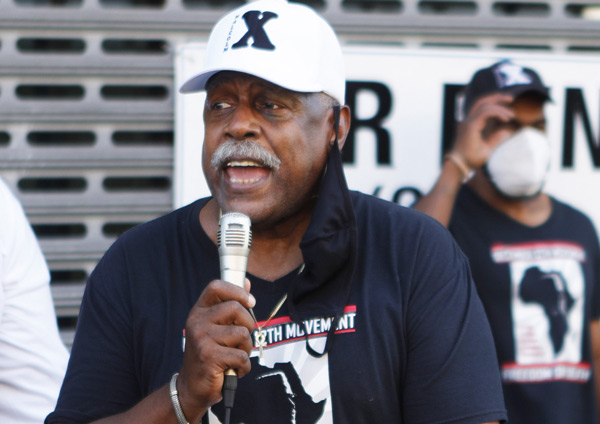Black History
Conversation with Omowale Clay: Excerpts

Our Time Press: I did not realize until that last interview we conducted with you over the summer that you are the graphic artist who created those revolutionary posters and messages for the December 12th Movement events. That’s amazing work. Impressive.
Omowale: I was telling this young brother the other day about Sonny Carson, a very of brother in terms of the breath of who he could relate to. His tenacity on issues, and his instincts about what was on black people’s minds. To have that skill, you have to have a real symbiotic relationship with the people, feel what they’re saying and articulated it back. Sonny said that what he liked was that I took what he was saying and articulated through the visual. I said to the young brother, “I’m giving you some history that you won’t necessarily find written, but it is to give you an idea through this medium of who these leaders were. Leaders like Elombe Brath, Father Lucas, and Bro. Carson. People who are not with us anymore but played a very important part in our history.” I approached this work as echoes of their messages in these posters.
I was listening to conversations about defunding the police, taxing the rich, stopping the layoffs. I listened to the shouts of , “No justice, no peace” and it made me think of a conversation I had with Willy Floyd Ricks — his name now is Mukasa — who was prominent in the Civil Rights Movement. One night, we stayed up all night long talking. It was about 6:30 and the sun was coming up, as he talked to me about the Civil Rights Movement, the demonstrations. He was in and out, of the history. I remember saying to him, “A lot of people don’t know that you brought the “Black Power” phrase out of obscurity and to the frontlines. In a sense, you coined the message behind it, as an anthem for the people, but a lot of people don’t know that. The graphics attempt to capture a particular moment in time, and the significance of that moment to the people. “No Justice, no peace: Whose streets, Our street,” are timeless sayings. True when they first came into being, true now.”
OTP:So how have the messages changed or evolved in relation to the work that has been done by the December 12 Movement compared to the work that has to be done in this time?
Omowale: The change started happening sixty years ago. The Civil Rights Movement helped ignite or gave intensity to the struggles in terms of the liberation of Africa, because many of the brothers and sisters who played a revolutionary role in Africa were schooled right here, or in England.
I always remember the historic picture of Kwame Nkrumah, sitting on a dais with Malcolm X, Adam Clayton Powell Jr. and the journalist Chuck Stone. Black Power’s roots began to emerge in the late 60s. Nkrumah had attended school here. He listened to the ideas here, and took them back home. When you ask the question about the seeds of the emergence or what was emerging, I recall something Malcolm X said. ‘It’s not a struggle for Civil Rights, he said. It’s a struggle for Human Rights.
The most significant thing that unites what’s happening to us here and what was happening to us where we came from is Pan-Africanism: the idea that oppressed Africans anywhere are oppressed Africans everywhere.
This is important because the issue of self-determination is an international norm. It is not tied to America or an American philosophy.
The American state can’t define what our rights are and confine it to a structure that Americans sit over, monitor and arbitrate. This is an international norm codified in human rights, the rights of nations, and of oppressed people to liberate themselves.
Malcolm was aware he stood on the shoulders of some who saw that vision, long before the 1960’s. Like George Padmore, a major figure in radical thinking and vision, and an advisor to Nkrumah during Ghana’s quest for independence. Malcolm took his vision and brought it to the masses because some of those issues back then were very class-based: you know, we have a right to human rights. Our Civil Rights can’t be simply adjudicated under the same state apparatus that oppressed us and enslaved us in the first place.
And then you’ve got to understand what self-determination really means. December 12 always viewed that as a question that we have the right to self-determination, up to an including secession. Because if that’s not part of the right, then it’s bogus. This is a struggle around giving people the actual ability and the space to talk about what is it they want as a people. During the emotion that emerges from slavery and that victory, the United States immediately gave us a definition in the 14th and 15th amendments that they said, We were now so-called citizens, they never said, what do y’all want to do? Do you want to stay? That question was never articulated.
OTP: Well, now, it seems the Pan Africanist movement has taken a backseat to this immediate concern of voter suppression in America. And we seem to be fighting a lot of battles that were fought 50 years ago.
Omowale:This comes back to the question of our rights, comes back to the question of the failure of this political economy, and now the scapegoating of the cause.
Trump is a reflection of the crisis in this country, in the whole superstructure, and political economy. In this country, it cannot even artificially provide the illusion that we’re doing better.


